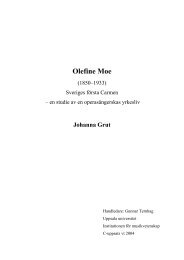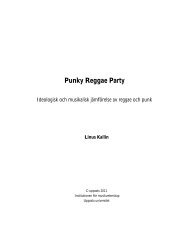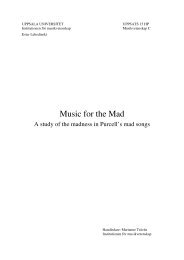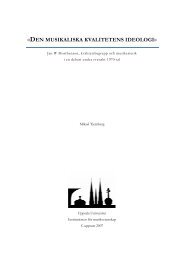What Does Donna Lee Mean? - Institutionen för musikvetenskap ...
What Does Donna Lee Mean? - Institutionen för musikvetenskap ...
What Does Donna Lee Mean? - Institutionen för musikvetenskap ...
Create successful ePaper yourself
Turn your PDF publications into a flip-book with our unique Google optimized e-Paper software.
Neutral analysis<br />
Neutrality doesn’t mean objectivity.<br />
Nattiez believes that the increased difficulty of the contemporary analytical discourse is a<br />
reaction to the impreciseness of the impressionist / historicist style of analysis of the 60’s<br />
(1990: 155). The contact with highly formalized disciplines such as mathematics, logic,<br />
information theory, linguistic or computer programming has prompted musical analysis to<br />
take upon a reconsideration of its own methods. The musicologist must nowadays clearly<br />
state the parameters used in his analysis if he is to claim any scientificity for his task.<br />
The paradox is that no analysis can claim to be perfectly objective. There is already a<br />
choice – and thus a tendency to promote certain elements above others – when one chooses a<br />
determinate study object and poses specific questions as to how this object works. The<br />
classical refutation of objectivity by physicist Heisenberg claimed that “natural science does<br />
not simply describe and explain nature […]; it explains nature as exposed to our method of<br />
questioning” (Heisenberg 1958).<br />
When doing a neutral analysis, by no means does the word neutral mean objective or<br />
non-biased. There are many choices left to the analyst that come from a personal standpoint.<br />
As Nattiez says, an analysis “cannot be prevented from evolving in terms of its own<br />
problematic” (1990: 155). An analysis is not a mere reproduction, like the reflection on the<br />
mirror, but a simulation that tries to explain how a work functions.<br />
It is not our intention here to realize a purely immanent analysis of <strong>Donna</strong> <strong>Lee</strong> as in a<br />
pitch set analysis inspired in the theories of Allen Forte. Even if one is to determine some<br />
structural characteristics of Jaco’s solo, it is good to place these characteristics inside of a<br />
stylistic context so that conclusions can be drawn about the meaning of the solo played by<br />
Jaco. My thesis here is that Jaco’s solo builds a bridge between two worlds: that of modernity<br />
and that of tradition. Jaco intends to increase the credibility of the electric bass as a soloistic<br />
instrument. It is saying, “listen to all these things the electric bass can do and always could”.<br />
It is a breath of fresh air and a homage to the past. In order to prove this, I will do a<br />
classificatory analysis of the melodic devices found in Jaco’s which are considered<br />
characteristic of the so-called bebop style.<br />
Bebop style<br />
There is one name that runs parallel with the developments experienced by jazz improvisation<br />
during the 30s and 40s: Charlie Parker. His harmonic and melodic devices are today<br />
considered as the quintessential elements characterizing bebop. He was the inventor and main<br />
developer – together with Dizzie Gillespie and Bud Powell - of this style, whose influence<br />
13










